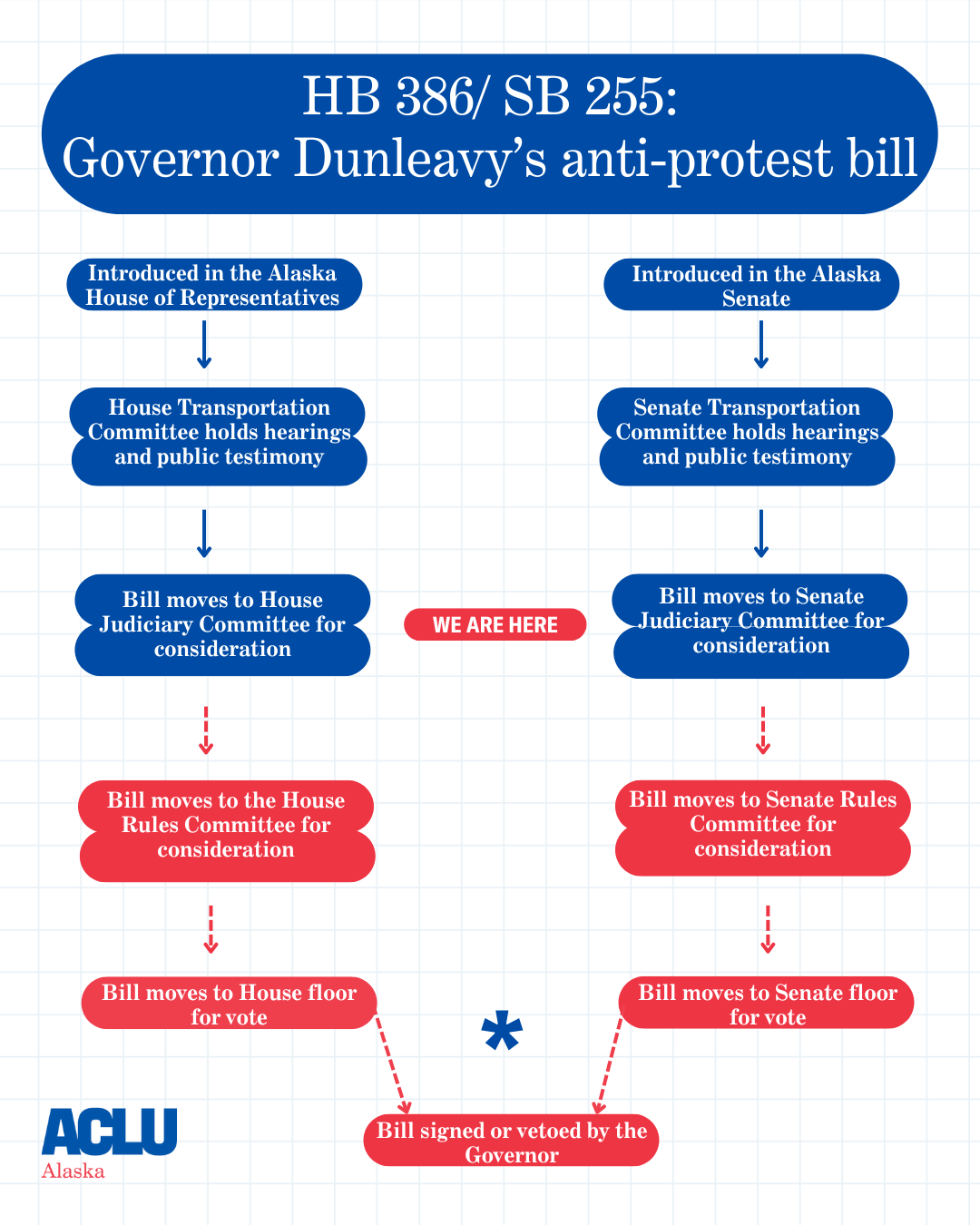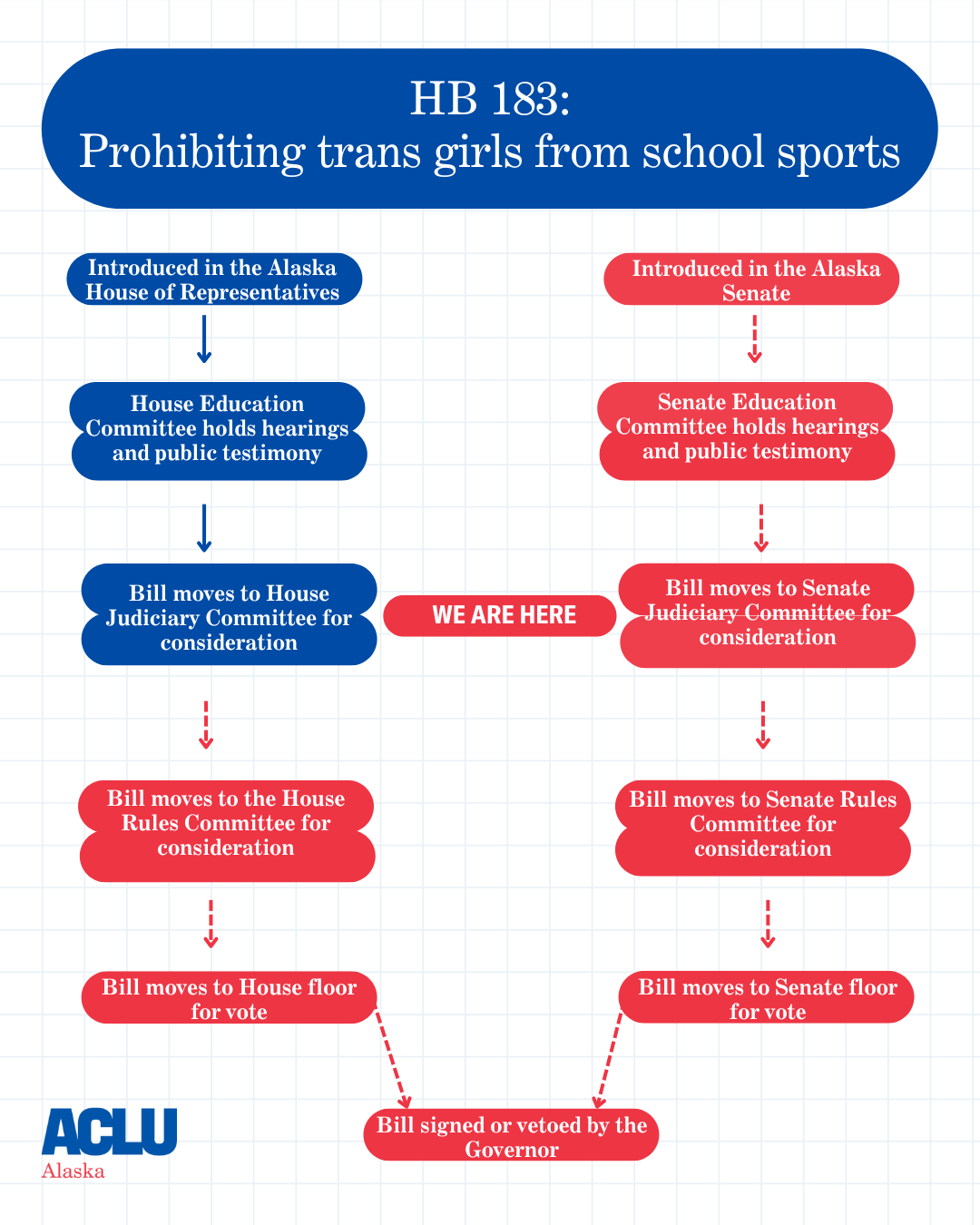Since the Alaska legislature started its session in January, we have been working to cover a wide variety of bills that implicate Alaskans’ civil rights and liberties — First Amendment rights to freedom of speech and assembly, rights within the criminal legal system, due process, equal treatment under the law, voting rights, and privacy. We’ve helped push back against legislation targeting queer and transgender Alaskans and worked to advance parole reform and oversight for deaths in Department of Corrections custody. Our bill tracker will help you follow legislation - both good and bad - that impacts the civil rights and liberties of all Alaskans.
We’ve called on Alaskans many times this legislative session to raise their voices in support and opposition of high-stakes bills. To everyone who has called your legislators, testified in front of a committee, and sent letters to decision-makers: thank you for speaking up for civil rights.
With roughly a month left in the legislative session, it’s a good time to check in on the bills we’ve been following closely and provide an update on where they stand in the process that turns a bill in to a law.
HB 386/ SB 225: Governor Dunleavy’s anti-protest bill

HB 386/ SB 255, introduced by Governor Dunleavy in February, would criminalize Alaskans who exercise their freedom of speech and assembly. The bill would create the new crime of “obstruction of free passage in public places,” which is constitutionally problematic. The language would capture a broad range of activity and contains no exceptions for lawful speech and protest. Additionally, the bill would make people civilly liable for this activity. It is a clear violation of the First Amendment and meant to scare Alaskans into silence through criminal and financial punishment.
Alaskans overwhelmingly opposed this bill in public testimony when it was heard in both the House and Senate Transportation Committees in March. Despite this, both committees advanced the legislation, which is scheduled for hearings in both Judiciary committees on April 10; the Senate Judiciary Committee will hear public testimony at 1:30 p.m.
The bills currently have no more committee referrals, meaning that if they advance out of the Judiciary, they could be scheduled for a vote by either the House or Senate. It’s vital that Alaskans do everything they can to block this bill, which already has the governor's endorsement.
HB 183: Prohibiting trans girls from school sports

HB 183 was introduced by Representative Jamie Allard (R- Eagle River) and cosponsored by Representative Tom McKay (R-Anchorage) to prohibit trans girls from participating in school sports across Alaska. The bill was considered by the House Education Committee, and despite Alaskans (again) overwhelmingly opposing the transphobic bill in public testimony, advanced the bill out. The legislation would enshrine in law the 2023 decision from the Department of Early Education and Development to prohibit trans girls from school sports through state regulation. The House Judiciary Committee is the only other committee currently listed to hear the legislation and will hold a hearing on Friday, April 12, at 1 p.m., and will hear public testimony. If the House Judiciary Committee advances it, the House Rules Committee could put it on the floor for a vote. There is not a Senate companion bill, and even if the House were to pass the bill, it seems unlikely the Senate would take up such a harmful and divisive bill. But we will continue to work to stand in its way.
The ACLU of Alaska has a large docket of other bills that we are watching. Here’s a quick rundown of other bills of importance to civil rights issues and where they stand.
- Elections legislation. Over the last few legislative sessions, the legislature has considered a variety of legislation to modify Alaska’s elections system and came close to passing a package of reforms in 2022. We are hoping that the legislature will get a package across the finish line this year to strengthen Alaskans’ voting rights — including by passing common-sense fixes to demonstrated problems, like a ballot-curing statute that would allow voters to fix benign mistakes with their absentee ballots. Earlier this year, we sent this message to the legislature during testimony on HB 129, a bill narrowly focused on Alaska’s voter rolls.
- SB 176: Parole board composition. Legislation by Senator Löki Gale Tobin (D- Anchorage) to reform the composition of the Alaska Board of Parole is a priority bill for the ACLU of Alaska’s Prison Project. In March, ACLU of Alaska staff and parolee Sylvester Byrd Jr. testified in support of SB 176 in the Senate State Affairs Committee. We are hoping for another committee hearing this legislative session, and a strong show of public support for the bill, which would achieve a more appropriate balance between the punitive and rehabilitative purposes of Alaska’s criminal legal system.
- HB 338: Physician liability for gender-affirming care. Representative Jamie Allard introduced HB 338 to the House of Representatives in February. HB 338 would allow people who receive gender-affirming care before the age of 18 to sue the doctor who provided the gender-affirming care for monetary damages “for an injury or condition suffered as a result of the procedure.” This bill was directed to the House Judiciary Committee, but a bill hearing has not been scheduled or held.
- Other criminal legal system legislation: We are watching many other policies that would alter Alaska’s criminal legal system for better or worse. Among them is HB 66, a bill introduced by the governor that is intended to address the state’s drug overdose crisis but relies on increasing punishments rather than proven public health strategies. It passed the House last year and was last heard by the Senate Judiciary Committee in February.
Additionally, we are also watching for measures that reduce the harm of the criminal legal system, like HB 28. Introduced by Rep. Stanley Wright (R-Anchorage), the bill would generally make low-level marijuana convictions — conduct that is now legal in Alaska — confidential, reducing barriers to employment and housing. With about a month left in session, we are hoping measures like HB 28 pass or advance as far as possible.
The legislature’s last expected day of session is May 15, 2024. We will continue to monitor bills that threaten civil rights for Alaskans, and uplift and support bills that expand civil rights for people across the state. Stay tuned for more updates.